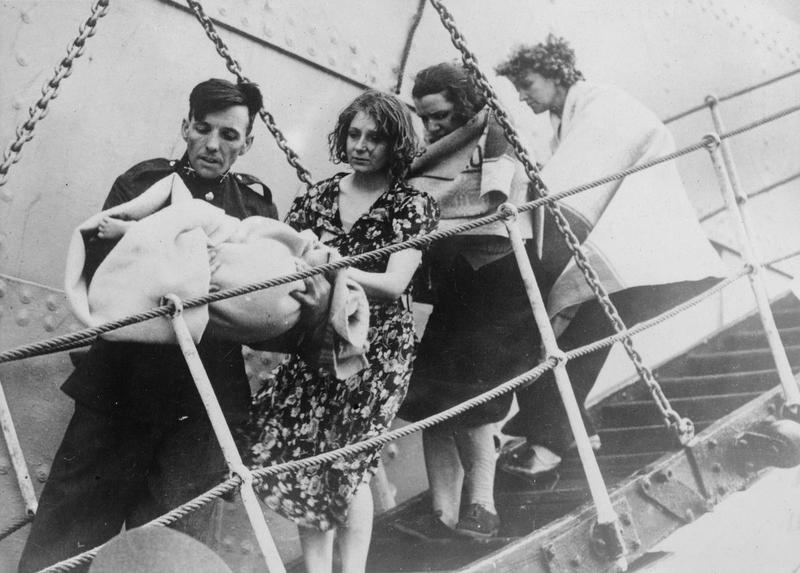The Dastardly Sinking of the 'Athenia'
The War Illustrated, Volume 1, No. 1, Page 12, September 16, 1939.
Hardly had the world realized that war had again begun when it received with a thrill of horror the news that the German U-boats had claimed their first victim. Without a word of warning, a passenger liner was torpedoed and sent to the bottom, 200 miles from land. The crime is described below and in a later page.
On the night of Sunday, September 3rd – the first night of the war, so far as Britain was concerned – the moon, rising above the sea some 200 miles beyond the Irish coast, looked down upon a scene of horror such as had not been witnessed since the close of the Great War. In the silvery waters a ship, mortally stricken, was sinking, while the sea about her was illumined by the flares borne by the boats lowered from her doomed shape.
 Pathetic scenes were witnessed at Galway as the Athenia survivors were landed.
Pathetic scenes were witnessed at Galway as the Athenia survivors were landed.
A few minutes before, the Athenia had been pursuing a steady course en route from Belfast to Montreal. Her 1,400 passengers had been seated in the lounges or at the dinner tables, talking about the war which had so suddenly come upon the world, and fondly anticipating the reunion with their relatives and friends which they confidently expected in the course of a few days. Among them were several hundred Americans returning from their curtailed visits to London or Paris, and also many refugees who, fleeing from the terror on the Continent, were seeking in the New World that peace and security which had been denied them in their homeland.
Suddenly, as dusk fell, the ship shivered beneath a shock. Few could have guessed the cause of the explosion, but without a trace of panic passengers proceeded to their lifeboat stations.
They were not left long in doubt. According to several of the survivors who reported their experiences the next day, they saw a short distance away, emerging from the waters, the sinister hull of a submarine ; it turned a gun on the ship and fired at her wireless. . . Within a few hours, then, of the opening of the war, the German U-boats had made their reappearance.
There ensued a succession of horrors, illumined by many a flash of human bravery and endurance. On by one the boats were lowered into the sea. In the hurry of the moment – perchance owing, too, to the list of the sinking vessel – some capsized, throwing their human load into the waters. From all sides came desperate shouts for help.
Meanwhile the ship’s S O S signals had been received, and many a vessel hurried forthwith to the Athenia’s rescue. About 2.30 on the Monday morning the steam yacht Southern Cross arrived and found that already the merchantman Knute Nelson was standing by and had rescued a number of passengers. Some what later three English destroyers dashed up at top speed and took part in the rescue operations.
All through the night and the hours of morning the Athenia settled in the water. At 10 a.m. her bow thrust itself into the air ; then she sank into those waters which twenty years before had formed a grave for so many brave British ships.
When the survivors were landed they had much to tell of heroism of all who had played a great part in the ordeal.
"Marvelous crew, heroic passengers, perfect morale," was the general verdict. Yet they had, too, many stories to tell that were heartrending in their stark simplicity.
"One lifeboat turned turtle nearing the stern," said a message from the Southern Cross, "our seamen rescued most. A man stood on the keel and dragged the drowning ones from the water. A young woman pulled from the water sat for a moment quietly in the rescue boat and then, screaming "My baby!" leaped into the sea.
One boat was swamped near our bow. All hands were engaged in hauling aboard those from another one and we were helpless to save. Their screams were heartrending. "Lifeboats were crammed to the danger point, many filling with water and people sitting waist deep.
"Many of the passengers were injured," went on the statement, "some seriously. A Russian Jewish couple, starting a new life in the United States, saw their two young sons drown when the boat capsized at the stern...
"While the boats maneuvered to come alongside a great school of whales plunged around them. Many woman rowed along with the men 8-10 hours – many with clothing torn off, black with grease, barefooted, penniless, but answering with a smile after a night of horror without precedent."
Historical context, by the webmaster
Photo: HU 51012.
Index
Previous article
A Triumph of British Civilian Organization
In the four days ending Monday, Sept. 4, 650,000 schoolchildren and others were evacuated from Greater London. No tribute was more highly earned than that paid by Mr. Herbert Morrison, M.P., Leader of
Next article
Britain's Royal Navy
"The royal navy of England," wrote Sir William Blackstone, "has ever been its greatest defence and ornament ; it is its ancient and natural strength ; the floating bulwark of the island." The statemen



